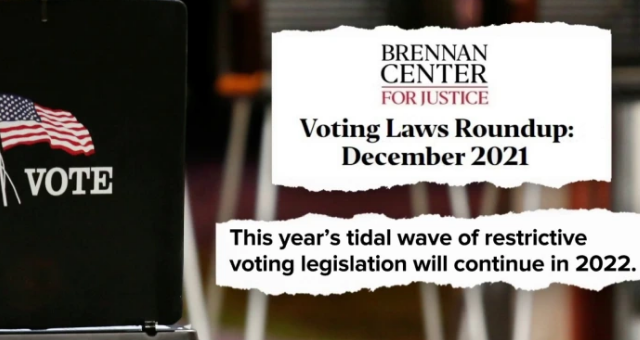Photos: Twitter
On Monday, Martin Luther King Jr. Day, the Senate will consider rules changes to allow passage of the John R. Lewis Voting Rights Advancement Act. As the showdown vote approaches, opponents are scrambling for reasons not to pass the landmark voting rights legislation. Their leading arguments, which range from factually inaccurate to historically naïve, are reviewed and rebutted below.
Election reform must be done on a bipartisan basis
It would be lovely if both parties supported free, competitive, inclusive elections. But they rarely do. . . at the same time.
In the 1820s and 1830s, for example, Jacksonian Democrats unilaterally pushed to enfranchise poor and working-class white men. The 15th Amendment, which prohibited states from denying Black Americans the right to vote, passed Congress in 1869 with precisely zero Democratic votes. Reconstruction-era Democrats were equally unified against the 14th Amendment and the Ku Klux Klan Act. Should Republicans have waited for Democrats to come around while people of color were denied full citizenship?
This is not an argument to postpone election reform — it’s an argument for Republicans to get on the right side of history.
Voter suppression laws don’t actually suppress votes, so there’s no need to preempt them
This claim is factually inaccurate.
Voter suppression laws not only deter people from voting, they do so in a targeted and discriminatory manner. Take voter roll purges.
For much of the 2010s, Georgia disqualified voters for tiny discrepancies (such as the absence of a last-name hyphen) between their voter registration forms and other state records. In the run-up to the 2018 midterms, the exact match system snagged more than 50,000 voters, over 80 percent of whom were people of color. (For perspective, Stacey Abrams lost the 2018 race for Georgia governor by fewer than 55,000 votes.)
A note to journalists and others who look at the laws on the books: many of the worst ones were blocked by courts, and others were softened and their provisions improved the same way. But the Supreme Court has now twice gutted the tool courts used to protect voters, the Voting Rights Act. Expect far worse to come.
“Can’t prove it” has long been the refrain for those who deal in the dark arts of voter suppression. But, as with tobacco and carbon emissions, you can only deny mounting evidence for so long. Legendary conservative jurist Richard Posner, who voted in 2008 to uphold Indiana’s voter identification law, came to regret his decision as evidence mounted of its ill effects. Posner’s changing stance in the face of changing evidence should be a model for all of us.
Gerrymandering isn’t a big problem
Republicans, who currently control the redrawing of 187 congressional districts compared to just 75 for Democrats, have passed heavily gerrymandered legislative maps in Texas, North Carolina, and beyond. Some contrarian pundits, however, have pointed out that the balance of seats in Congress could remain roughly the same, if the 2022 election returns resemble those of 2020. Where’s the gerrymander, they ask?
This is a blinkered and naïve view of redistricting.
As my colleague Michael Li points out, Republican map drawers have used the redistricting process to shore up the districts they already gerrymandered heavily in 2010. As a result, North Carolina Republicans could carry 71 percent of the state’s seats in Congress with just 47 percent of the vote. Texas Democrats would have to win 58 percent of the vote to be favored to capture 37 percent of the state’s congressional seats.
The redistricting process has been particularly damaging to voters of color, whose districts were carved up to minimize their voting power. This isn’t gerrymandering in retreat, it’s gerrymandering 2.0.
Can’t we just reform the Electoral Count Act?
We should reform the Electoral Count Act. It’s a mess, and its ambiguities would have led us into a constitutional crisis had Vice President Mike Pence attempted to block the 2020 vote certification.
But reforming that law won’t prevent extreme gerrymandering, intimidation of local election officials, voter suppression, or the many other issues the Freedom to Vote Act and the John Lewis Voting Rights Act are designed to fix.












